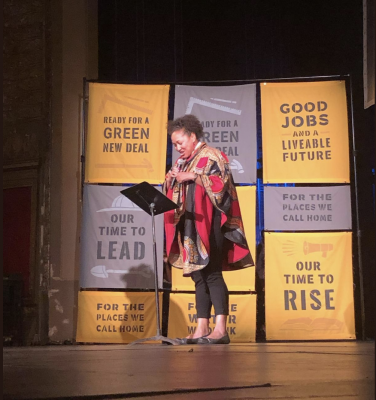Acting Mayor Kim Janey appointed Rev. Mariama White-Hammond as Boston’s chief of environment, energy and open space April 19, as former Chief Chris Cook transitions to The Rose Kennedy Greenway Conservancy as executive director.

White-Hammond, a Boston University alumna, founded New Roots AME Church in Dorchester and is a fellow with the Green Justice Coalition. She will officially step into the position Monday.
“I am committed to supporting Mayor Janey’s agenda for recovery, reopening and renewal through an equity lens and that creates sustainable opportunities for Bostonians,” White-Hammond stated in an April 19 press release.
Responsibilities of the role include protecting climate, water, air and land resources, in addition to preserving historic and architectural resources, according to the press release.
“Reverend Mariama White-Hammond is an advocate, facilitator and pastor who has extensive experience in creating a more just, inclusive and sustainable Boston,” Janey stated in the release.
As chief, White-Hammond is tasked with guiding sustainability, environmental justice, climate change and energy policy and programs, like Greenovate Boston — a community sustainability project.
Other priorities include building safety, rental registry and preserving historic and open spaces.
“I think what we’ll see from Rev. Mariama is that she is always looking at things through a social justice lens,” said Maiyim Baron, an environmentalist with the Massachusetts chapter of Elders Climate Action. “She’s so good at seeing how these things are connected together … I’ve known her since 2016, and she was one of the first people I heard talking about intersectionality.”
Baron said the Office of the Environment will see White-Hammond’s consideration of social justice in her approach to environmental policy.
“She’s been into social justice issues long before environmental issues, but she sees how they go together,” Baron said.
An example of White-Hammond’s approach can be seen in her three-point agenda to combat climate inequities exacerbated by COVID-19: utilizing community gardens to increase food access, creating more green jobs for younger populations via workforce development and employing fair cooling plans.
“I think Rev. Mariama is smart enough to take advantage of some of that research that’s been done,” Baron said. “You often can look towards making policy based on some of that work that’s already been done.”
White-Hammond will work to progress toward the city’s goal of carbon neutrality by 2050, which Baron said the city has the capability to achieve quicker than the rest of the country. Baron suggested Boston build on the successes of wind farms.
“We have great opportunities to use lots of wind power, we’re very rich in that,” Baron said, “and that’s one of the biggest tools we can use to move off of fossil fuels.”
Some environmental activists and groups in Boston have suggested a carbon tax at the local level to combat the negative externalities caused by carbon emissions, but Baron noted the unpopularity of anything called a “tax.”
“There’s a lot of potential policy levers, I don’t know if a local carbon tax would or wouldn’t be one of them,” said Jonathan Levy, professor in the Department of Environmental Health at BU’s School of Public Health. “There’s a lot of obvious complexities going into local versus state versus federal policy.”
Levy said Boston must go beyond policy measures such as the Transportation and Climate Initiative, which is a regional effort across 13 Northeast and Mid-Atlantic states to reduce carbon emissions from the transportation sector.
When asked about possible policy prescriptions, Levy suggested focusing on sustainable transportation that allows people to more easily walk, bike or take public transportation.
He noted that climate change disproportionately affects vulnerable populations and communities of color, adding that White-Hammond and others in Janey’s administration are capable of working toward environmental justice.
“We need an environmental justice lens on each of those actions, as well as a public health lens,” Levy said. “Who is going to benefit from these actions? … Rev. Mariama’s perspective here will be quite valuable to center environmental justice.”






















































































































